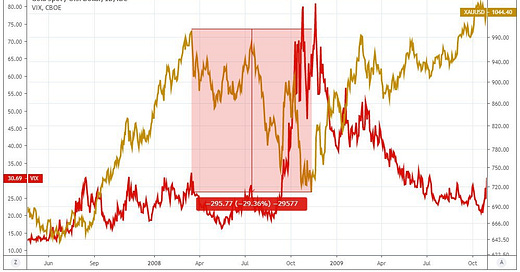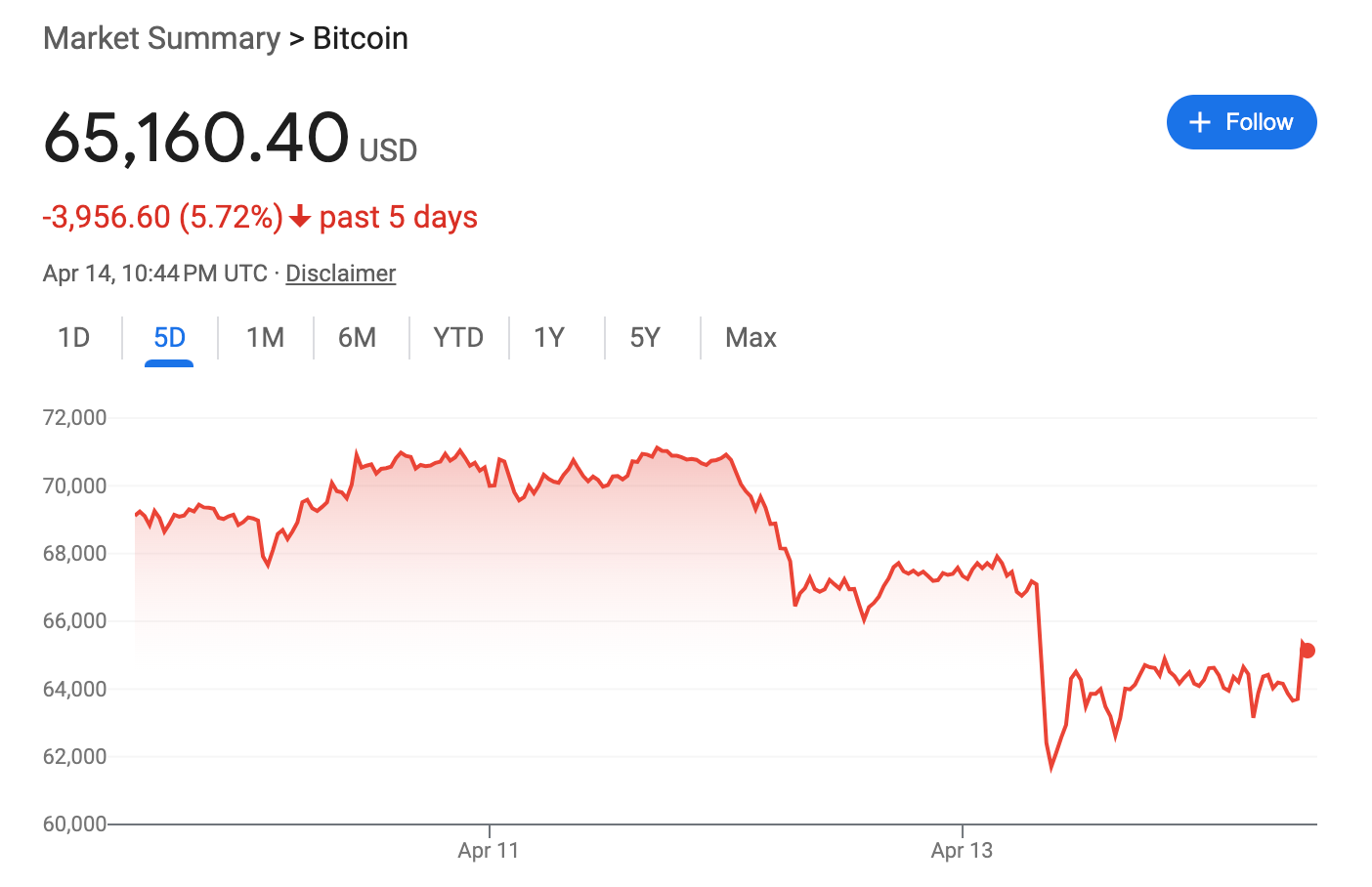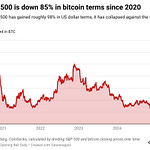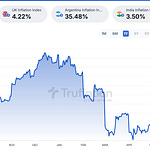To investors,
Iran launched a barrage of missiles and drones at Israel over the weekend. This escalation of force did not come as a surprise to the United States and our allies.
Days in advance, Iranian leadership told various countries that they planned to retaliate after Israel reportedly destroyed Iran’s embassy in Damascus, Syria. Thanks to this heads up, almost 100% of the 300 missiles launched by Iran were intercepted and/or thwarted during the attack.
There was even an exoatmospheric interception of a ballistic missile, which may be the first time it was captured on video for social media.
This all happened less than 48 hours after I wrote a letter to this group on Friday titled Is Gold Warning Us About An Incoming Geopolitical Event? It appears that gold was sounding the alarm bell.
I tweeted on Saturday shortly after the attacks:
Potential gold all-time high theory — Gold’s recent price increase could have been Iran buying large amounts of gold. They were doing this because they anticipate swift and severe financial sanctions from the US after the drone attack launched today. I am not arguing that this is true, but it is an interesting theory that would line-up with the current timeline of events. The world is becoming more dynamic. The intersection of finance and geopolitics is only going to become more complex in the coming years.
We don’t know if this theory is true, but we will probably find out in the coming weeks. Gold wasn’t the only story in finance related to the recent attacks. We also got more data from the bitcoin market.
This data begs the question — if Iran had given everyone a heads up that they were going to attack, and the barrage of missiles and drones was successfully defended against, why would the price of bitcoin drop more than 10% in an hour and remain suppressed throughout the weekend?
CNBC’s Andrew Ross Sorkin asked on X:
“Trying to understand Bitcoin's price movements this weekend...If it is, as Bitcoin bulls believe, a store of value, during a war, wouldn't it be a considered safe haven? And if it is a hedge against inflation, wouldn't buyers rush to it out of fear that countries will spend more on conflict? What explains its fall? I'm genuinely curious to hear various perspectives...”
These are great questions. Bitcoin has been put on a pedestal as many different things to different people. Here is my best attempt to answer Andrew’s questions, while also explaining why bitcoin and other assets act erratically during times of global instability.
If you remember during COVID, all assets sold off as it became apparent the pandemic was going to be a big, negative situation. Investors were in panic.
I wrote a letter to this group on March 12, 2020 titled The Liquidity Crisis Will Drive Monetary Stimulus, Which Will Force The Adoption Of Sound Money Properties. Here is an excerpt from the letter:
“Unfortunately, we are watching a liquidity crisis play out in real-time. These liquidity issues are well understood structurally, but feel much worse than expected when they occur in reality. A liquidity crisis means that investors all rush to the exit doors at the same time, but there are so many more sellers than buyers that investors actually have a hard time offloading their assets for cash. Quite literally, investors begin aggressively lowering the price they are willing to accept for each asset in exchange for the cash which they are desperately seeking right now.
This is why you are seeing any asset with a liquid market tanking so hard right now.”
I went on to explain that the properties of an asset don’t change just because investors enter a moment of panic. Here is an excerpt from the same letter describing gold’s performance during the Global Financial Crisis:
“During the 2008 global financial crisis, gold dropped in price by more than 30% leading into the depths of the real pain. This isn’t because gold is a bad store of value or that it had lost safe haven status after 5,000 years. It is because gold has a liquid market and investors needed liquidity over anything else.”
This shows that all assets, regardless of why investors are holding them, will sell off during desperate moments of uncertainty and chaos. The correlations between asset classes moves towards 1. The investment community only wants US dollars in these moments over the last 15-20 years.
A similar dynamic played out over the weekend. It just so happens that the stock market and other tradable markets were closed during Iran’s attack. Bitcoin/crypto was the only market open on Saturday, so we shouldn’t be surprised that the assets sold off aggressively within minutes of the attack being launched.
Additionally, the attacks were not occurring within a silo. Bitcoin’s sell-off in the last 3 days coincided with the last 3 days before American citizens have to make tax payments today. Historically, we have seen bitcoin drop in the 2-3 days before tax day as holders sell the asset to raise cash to pay their taxes.
This means there were multiple factors responsible for driving bitcoin’s price down this weekend. My expectation is that the stock market will open and fall this morning, but we will have to wait to see what happens.
The good news is that I anticipate bitcoin will likely be one of the assets that leads the price recovery across markets, whenever that happens. Bitcoin seems to be the first mover in both directions, so it led on the way down and it should lead on the way back up too.
As I tweeted on Saturday shortly after the attacks were publicly known, “Financial assets almost always overreact to geopolitical rumors, threats, or attacks. It is in those moments that the true emotional control and clear thinking of investors is tested.”
Remember…fear is measured in days, but hedges/insurance are measured in weeks, months, and years.
Don’t get distracted by the noise. Stay focused on the long-term. Hope you all have a great start to your week. I’ll talk to everyone tomorrow.
-Anthony Pompliano
Reader Note: Today is a free email available to everyone. If you would like to receive these letters each morning, please subscribe to become a paying member of The Pomp Letter by clicking here.
Chris Kuiper is the Director of Research for Fidelity Digital Assets. Yassine Elmandjra is the Director of Digital Assets at Ark Invest. Matthew Siegel is the Head of Digital Assets Research for Vaneck. Will Clemente is the Co-Founder of Reflexivity Research.
This conversation was recorded at Bitcoin Investor Day in New York. In this conversation, they discuss bitcoin evaluation process, bitcoin ETFs, client demand, regulation, crypto industry, and future outlook.
Listen on iTunes: Click here
Listen on Spotify: Click here
Fidelity, ARK, VanEck Reveal How They Evaluate Bitcoin
Podcast Sponsors
Core Scientific is one of the largest public Bitcoin miners and hosting solutions providers for Bitcoin mining in North America.
iTrustCapital allows you to buy and sell cryptocurrency in a tax-advantaged crypto IRA.
Supra - Join Supra’s early integration program for zero-cost access to the fastest oracles and dVRF across 50+ blockchains.
Propy - Now, anyone can start their on-chain journey by minting home addresses via PropyKeys and staking them for profit until they are ready to sell their home.
BetOnline - Use crypto to bet on sports, casino games, horse racing, poker and more with promo code POMP100.
Espresso Displays - The world's thinnest touchscreen portable monitor. Expand your workspace and work from anywhere.
ResiClub - Your data-driven gateway to the US housing market.
Bay Area Times - A visual newsletter explaining the latest tech & business news.
You are receiving The Pomp Letter because you either signed up or you attended one of the events that I spoke at. Feel free to unsubscribe if you aren’t finding this valuable. Nothing in this email is intended to serve as financial advice. Do your own research.















Share this post